Britt Koehnlein
Ph.D. candidate
Department of Political Science
College of Arts & Sciences
Britt Koehnlein’s research focuses on civil conflict, vaccination campaigns, epidemics, and climate change, with a focus on sub-Saharan Africa.
Britt Koehnlein
Ph.D. candidate
Department of Political Science
College of Arts & Sciences
Britt Koehnlein’s research focuses on civil conflict, vaccination campaigns, epidemics, and climate change, with a focus on sub-Saharan Africa.
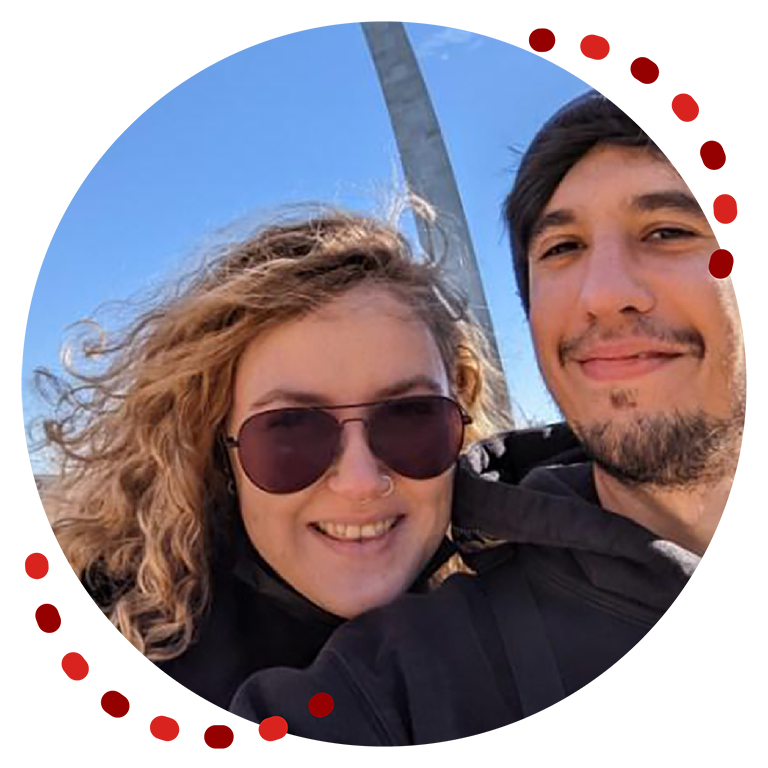
A doctoral candidate in the Department of Political Science and a 2022-2023 Ostrom Fellow, Britt has a published, co-authored article in the Journal of Peace Research about the effects of Covid-19 on state capacity and violence by non-state actors, and a forthcoming co-authored article in Population and Environment, as well as policy-relevant publications for The Stimson Center and Political Violence @ A Glance. Her dissertation is focused on understanding the relationship between vaccination campaigns and state legitimacy and capacity, particularly in states that are experiencing or have recently experienced civil conflict.
Fluent in French and German, Britt earned a Bachelor of Arts in French and religious studies from IU Indianapolis and a Master of Arts in political science from Ball State University.
On March 8, Britt will present “Building Symbolic Capacity through Vaccination Campaigns” through the Ostrom Workshop Research Series, which highlights innovative research by graduate students and visiting scholars who build upon the theme of governance to understand and address major societal problems. The Ostrom Workshop, named for Elinor and Vincent Ostrom in 1973, celebrated its 50th anniversary on Jan. 23.
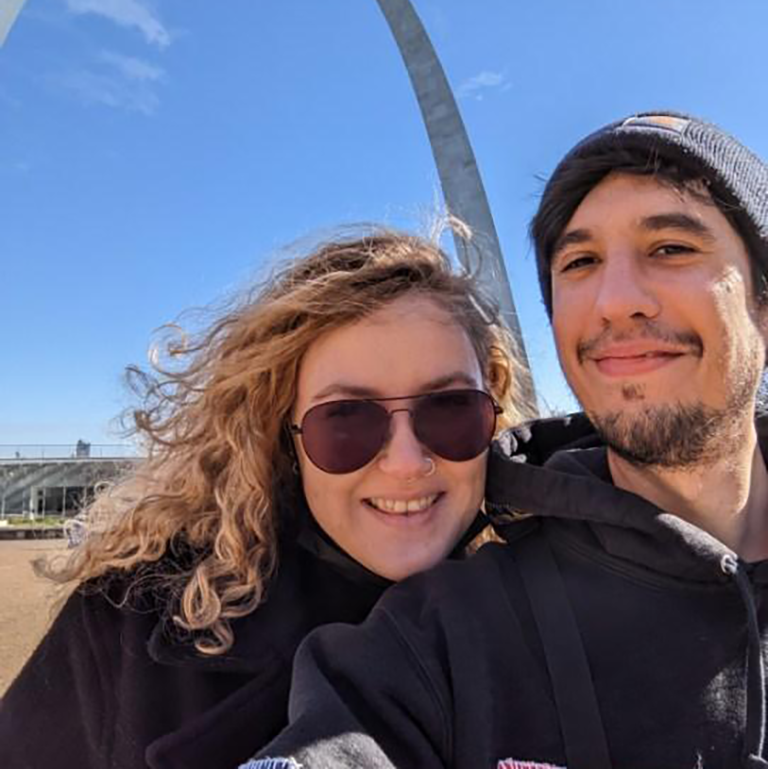
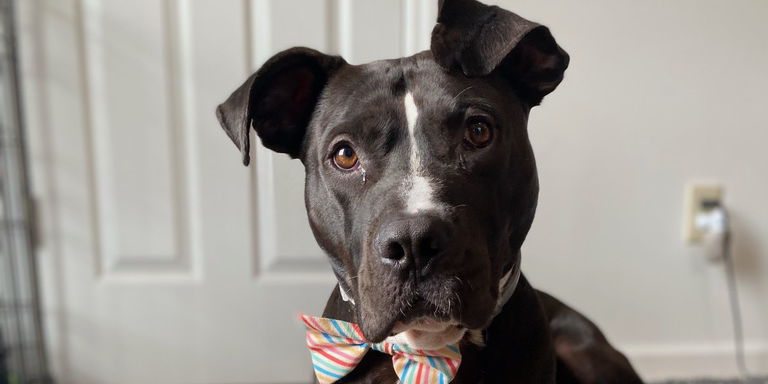
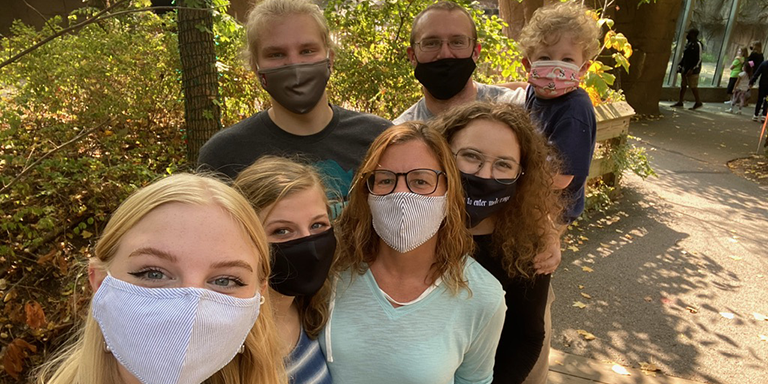
Left: Britt and her partner traveled to St. Louis for a conference and snapped a photo with the Gateway Arch. Top right: Britt’s sweet pup, Button, graduates from obedience school. Bottom right: Britt's family enjoys the Indianapolis Zoo on her nephew's birthday.
Q: What led you to IU to complete your graduate studies, and what resources and connections has the campus provided to support and enhance your research?
A: After getting to talk to current students in the program and a few professors during my campus visit, I knew IU would be a good fit. Students and faculty were doing interesting research, and the political science program had strong ties with other departments that would fit within my own research, including international studies and the Ostrom Workshop. I also had visited IUB during my undergraduate studies and knew how great of a community and city Bloomington was.
I have received funding for conferences, travel, research, and writing through my department, the College, and the campus, and have taken advantage of IU resources including workshops through the Center for Innovative Teaching and Learning and the Wells Library; talks from diverse departments; and solidarity for finishing projects with writing groups run by Writing Tutorial Services. I have also gotten the chance to network with a variety of scholars through the Department of Political Science’s World Politics Research Seminar each semester, as well as through Ostrom Workshop Colloquiums and Research Series. These connections and my advisor have allowed me to conduct research and publish in top-tier journals in my field.
Q: In your upcoming workshop session with the Ostrom Workshop, you outline the ways that vaccination campaigns can allow states to build short-term legitimacy in the eyes of citizens. Can you share the wider implications of this research and why it’s important?
A: Vaccinations are important not only for the health of citizens, but for improving capacity within states that are in conflict, or in newly independent states. Vaccination campaigns are one way to improve short-term state legitimacy and establish the longer-term building of material capacity.
States in these situations are often limited by amount and type of resources available; reach and resilience of different infrastructures (such as roads or supply lines); restraints on consolidation efforts; and legitimate control of violence. Not only is capacity building difficult in these cases, but external shocks — like natural disasters — can be disruptive and weaken states further.
Much existing literature suggests capacity is improved through transparency, free and fair elections, being responsive to citizens, and effective use of natural resources. These, in tandem with improving education, health care, disaster preparedness, and physical safety, increase a state’s ability to govern. But these changes and improvements are not always possible — particularly not right away, or at the same time — and weakened states can get caught in a loop of improving one area at the expense of another. It is often important for struggling states to first improve their symbolic capacity, or legitimacy, to also be able to improve their material capacity (e.g., military capacity, public goods provision, ability to tax, administrative capacity).
Q: Describe your connection to the Ostrom Workshop and how it connects to your research.
A: I first connected with the Ostrom Workshop through my advisor, Ore Koren, and other members of my dissertation committee. My initial research connection to the workshop involved my examination of failed states and how local communities and rebel groups often step up — and in — to fill the power vacuum left by weak central governments. While my research has somewhat shifted from this, Ostrom research and ideas still offer me powerful ways of understanding and approaching my current research.
Through Lin Ostrom’s notions of polycentricity and multitiered governance structures — along with her Institutional Analysis and Development approach to studying the interactions between communities, citizens, and local and central governments — I can take new approaches and incorporate new ideas into my work.
Q: What are some of the recurring discussion themes among students in your “Politics of Gender and Sexuality” and “International Political Controversies” courses? Anything surprise you about the lens of today’s students?
A: Many of my students are both tremendously ready to take on the injustices of the world and extremely worried about the future, but in a way that makes them increasingly ready to be themselves and make a positive difference. Many of the questions I get asked are how to do that in the best way possible in their classrooms, communities, and the world. I am genuinely inspired by my students and the initiatives they take.
I had multiple students in the "Politics of Gender and Sexuality" class go on to help run a variety of political campaigns in the 2022 midterm elections. I also had several students take internships for politicians at the local and state level over the summer. I sometimes think I am learning more from them than they are from me!
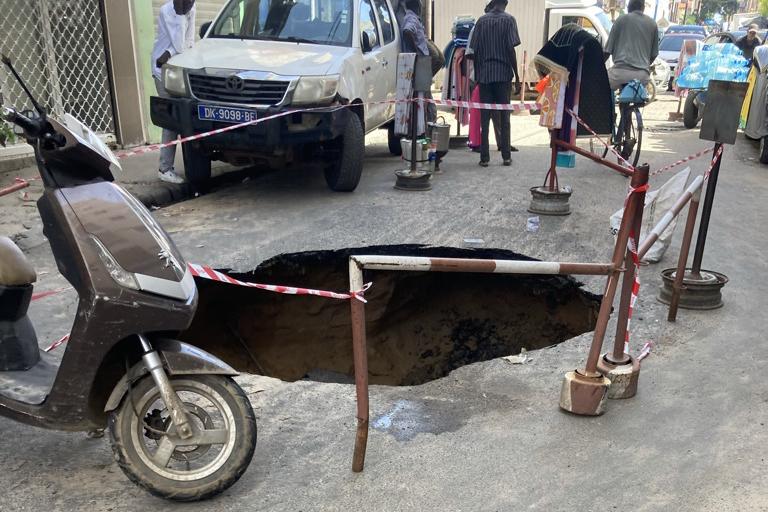
Q: Your studies and teaching have taken you all over the world — Thailand, Haiti, France, Germany, Senegal. What has been your favorite place so far, and where will you go next?
A: I get asked this question a lot, and I think my answer changes every time! Every place I have been offers something unique and a reason to be my favorite.
I started going to Haiti when I was 12 to help translate adoption documents from English to French and vice versa. I spent my free time playing soccer with the kids there and learning the tiniest bit of Haitian Creole (and getting laughed at for my terrible pronunciations). I lived in France when I was a sophomore and got to travel around Europe while taking courses at l’Université de Strasbourg and Sciences Po Strasbourg. Later, while taking classes in Germany after getting my bachelor’s degree, I tutored at an international high school and met incredible students who are now working and teaching all over the world.
And I can never say enough good things about Thailand and my time there! The friends I made are some of the most wonderful teachers I have ever met and really care about their students. The students I had (all 1,500 of them!) were all so curious and wanted to learn everything that they could. I helped many of them with study abroad and college application essays, and it has been such a joy watching them on their journeys into adulthood. My research took me to Dakar, Senegal last semester, and I am already trying to figure out how to get back.
Next on the list are Montreal this month (March 2023) for a conference where I’ll be presenting research on rebel violence following an epidemic, and then Nairobi in June, for a conference where I’ll present my Ostrom research on vaccination campaigns and state legitimacy. My partner and I are also planning a trip to Portugal in May to see my mom, who lives there, and a trip to Japan and Korea in December to visit a few of my friends and former exchange students.